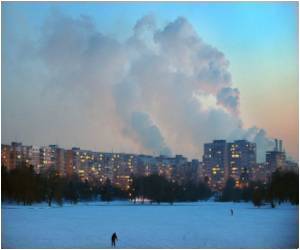
Bai was living just outside the Union Carbide factory when around 30,000 tonnes of methyl isocyanate (MIC) began spewing from a tank shortly before midnight.
Sirens only sounded for a few minutes and wind blew the highly toxic gas across the city. More than 3,500 were killed in the immediate aftermath but as many as 25,000 people are estimated to have died in the long run.
Bai suffered injuries, including mouth ulcers, which she has endured for the last 30 years, while her son Prabhu Lal has had several limbs amputated.
There is also the never-ending pain of seeing her daughter-in-law Jamuna die in hospital on the night of the disaster.
"She was seven months pregnant," Bai told AFP.
Advertisement
Over the years she and fellow activists have been beaten by police at protests and threatened with prison.
Advertisement
The plant sits abandoned behind walls, crawling with vines, weeds and snakes. E-610, the now rusting tank from which the poison sprang, is still identifiable by its fading serial number.
Amid disputes over whether the soil below will ever be safe, the control room remains labelled with signs including a sticker reading "SAFETY IS EVERYBODY'S BUSINESS".
The site is off limits, but Shahid Noor -- who was orphaned by the tragedy -- received permission last week to look around.
Speaking in an old laboratory, the 39-year-old recalled how the alarm was raised by the panicked sounds from the family's buffaloes.
"When I went outside, it was like someone had boiled 100 chilies together and thrown them in my eyes," he said.
His relatives tried to flee, but not all of them made it.
"My mother was taken to hospital and I never saw her again as she died there the next day.
"I was with my father when he passed away. He kept telling me his eyes were burning, and his chest exploding."
- Bodies on shelves -
N. R. Bhandari was medical superintendent at Bhopal's Hamdia hospital at the time.
"There were so many dead bodies coming in together. They were brought in the trucks and autorickshaws and taxis," recalled Bhandari, now 82.
"They were being put up on the shelf like you put files."
Those still alive were gasping or vomiting, their eyes burning.
"We could not do anything but give them some oxygen and some symptomatic treatment... we did the best we could."
While the official toll in the first three days was 3,500, Bhandari says the poison was the main cause of death of thousands for years afterwards.
In a 1994 report, the state-run Indian Council of Medical Research put the toll at 25,000.
Both Bai and Noor received compensation of 25,000 rupees (around $400 today) under a 1989 settlement between the government and Union Carbide, now a wholly owned subsidiary of US chemical giant Dow Chemicals.
Union Carbide paid $470 million and Dow insists all liabilities were settled at that time.
But campaigners say the settlement only provided compensation for some 5,000 victims and relatives.
The government filed a legal petition in 2012 seeking more compensation from Dow, but the case has made little headway in India's sluggish legal system.
- Hunger strike -
Safreen Khan was among a group who recently staged a hunger strike in Delhi to pressure the government. Khan said they thought they had persuaded it to increase compensation after meeting the chemicals minister.
But a ministry official told AFP that "everything about the issue is already in the courts. There are commissions and whatever facts there are have to be verified."
Salil Shetty, Amnesty International's secretary general, said the government must put much more pressure on Washington to get Dow to pay, drawing a comparison with the $20 billion compensation paid by BP after the Gulf of Mexico oil spill.
"We do feel that the government of India needs to take this much more seriously," he told AFP.
"It somehow feels that there is a different value being attached to damages and the lives being lost in the US, compared to a developing country like India and that is totally unacceptable."
The apparent stalling has added to a sense of justice denied, weeks after news that Warren Anderson, Union Carbide's boss in 1984, had died in a Florida nursing home.
Anderson was briefly arrested on a visit to Bhopal after the disaster, but was bailed and flew back to the US in a move activists say was part of a murky deal.
"He (Anderson) killed so many people so I am not sad that he died. I just wish he had died in prison," said Bai.
Source-AFP








